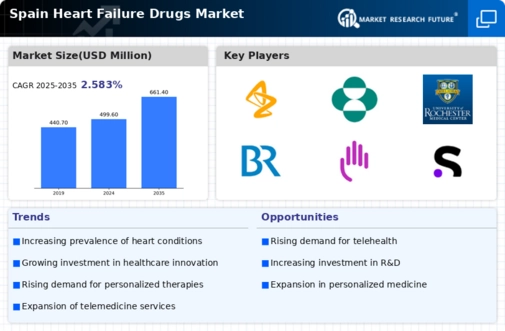Rising Healthcare Expenditure
The upward trend in healthcare expenditure in Spain is a significant driver for the heart failure-drugs market. As the government allocates more resources to healthcare, there is an increasing focus on chronic disease management, particularly for conditions like heart failure. In recent years, healthcare spending has risen by approximately 5% annually, reflecting a commitment to improving patient care. This increase in funding allows for better access to advanced heart failure treatments and medications, which may lead to improved patient outcomes. Furthermore, as healthcare providers adopt more comprehensive treatment protocols, the demand for heart failure drugs is likely to grow, thereby expanding the market. The emphasis on value-based care also encourages the use of effective therapies that can reduce hospitalizations and improve quality of life for patients.
Growing Awareness and Education
The growing awareness and education surrounding heart failure in Spain are pivotal in shaping the heart failure-drugs market. Public health campaigns and educational initiatives have been instrumental in informing both healthcare professionals and patients about the risks and management of heart failure. Increased awareness leads to earlier diagnosis and treatment, which is crucial for improving patient outcomes. As patients become more informed about their condition, they are more likely to seek medical advice and adhere to prescribed therapies. This shift in patient behavior is expected to drive demand for heart failure medications, as individuals recognize the importance of effective management strategies. Additionally, healthcare providers are increasingly prioritizing patient education, which further supports the growth of the heart failure-drugs market.
Advancements in Drug Development
The heart failure-drugs market is experiencing a surge in innovation, driven by advancements in drug development technologies. Pharmaceutical companies in Spain are increasingly investing in research and development to create novel therapies that target the underlying mechanisms of heart failure. This includes the exploration of new drug classes, such as SGLT2 inhibitors and ARNIs, which have shown promising results in clinical trials. The Spanish market has seen a notable increase in the approval of new heart failure medications, with several products launched in recent years. This trend is likely to continue, as regulatory bodies support the introduction of innovative treatments that can improve patient outcomes. The competitive landscape is evolving, with companies striving to differentiate their products through unique mechanisms of action and improved efficacy, thereby enhancing the overall heart failure-drugs market.
Government Initiatives and Funding
Government initiatives aimed at improving cardiovascular health are significantly influencing the heart failure-drugs market in Spain. The Spanish government has implemented various health programs focused on the prevention and management of heart diseases, including heart failure. Increased funding for research and public health campaigns is expected to enhance awareness and early diagnosis of heart failure, leading to a higher demand for effective drug therapies. Additionally, the reimbursement policies for heart failure medications are becoming more favorable, which may encourage healthcare providers to prescribe newer treatments. This supportive regulatory environment is likely to stimulate growth in the heart failure-drugs market, as patients gain better access to essential medications and innovative therapies.
Increasing Prevalence of Heart Failure
The rising incidence of heart failure in Spain is a critical driver for the heart failure-drugs market. Recent studies indicate that approximately 1.5 million individuals in Spain are affected by heart failure, with projections suggesting this number may increase by 20% over the next decade. This growing patient population necessitates the development and availability of effective pharmacological treatments. As healthcare providers seek to manage this chronic condition, the demand for heart failure drugs is expected to rise significantly. Furthermore, the aging population in Spain, with a substantial proportion over 65 years, contributes to the increasing prevalence of heart failure, thereby driving the market for heart failure-drugs. The healthcare system's focus on improving patient outcomes further emphasizes the need for innovative therapies in this sector.
















